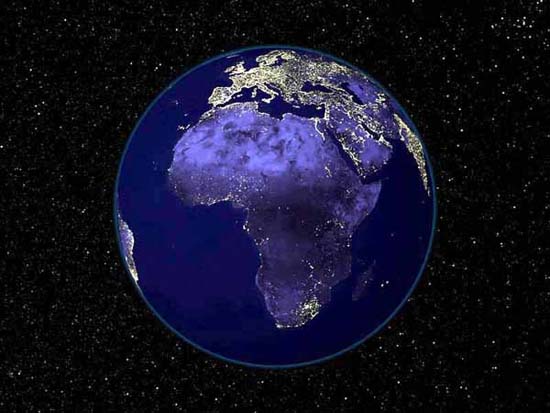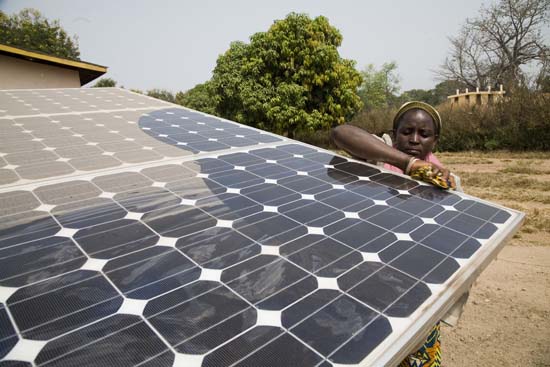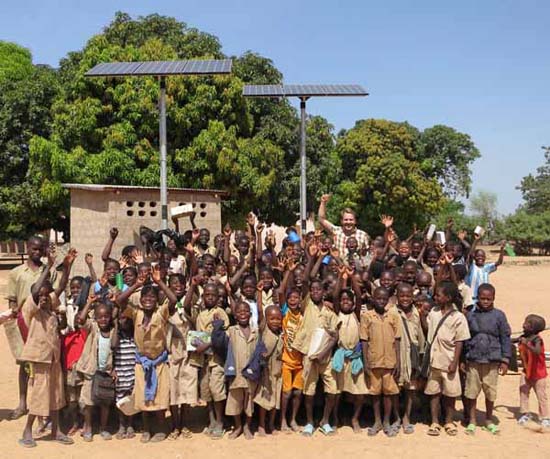"Access to electricity is fundamental to opportunity in this age. It's the light that children study by; the energy that allows an idea to be transformed into a real business. It's the lifeline for families to meet their most basic needs. And it's the connection that's needed to plug Africa into the grid of the global economy. You've got to have power. And yet two-thirds of the population in sub-Saharan Africa lacks access to power -- and the percentage is much higher for those who don't live in cities." -- President Barack Obama, Remarks at the University of Cape Town, June 30, 2013
The satellite image of earth at night says it all: except for a few urban areas scattered here and there, essentially the entire continent of Africa is shrouded in darkness. In many sub-Saharan African nations, as much as 90 percent of the rural population lacks access to electricity. No lights. No refrigerators. No computers. Nada, Zippo, Zilch.

When President Obama announced his administration's Power Africa initiative, I was excited at the prospect of more lights being turned on in Africa, more children being able to go to school and access online resources, more patients being treated and vaccinated at rural health clinics, more farmers finding ways to ensure their own food security, and more small entrepreneurs launching new businesses.
For those of us in the international development community who have been fighting energy poverty, this initiative is a big deal. Combined with the U.N.'s Sustainable Energy for All initiative -- whose primary goal is to ensure universal access to modern energy services for the world's poor by 2030 -- Power Africa can help make a significant contribution to the challenge of providing electricity to those who have none.
The bulk of the Power Africa initiative seems to be focused on developing electricity services for urban or peri-urban areas; however, it is important to note that the vast majority of people who suffer from energy poverty live beyond the reach of a traditional power grid.
These folks are not likely to have access to grid electricity anytime soon due to the exorbitant cost and logistical difficulty of extending power lines to remote parts of the world. Greater emphasis should therefore be placed on finding ways to power communities in remote regions and allocating appropriate funding to meet those needs. Solar and other renewable energy‐based power systems offer the best solution for meeting the energy needs of off-grid communities as they can be installed in very remote locations, do not have to be tied to a utility grid, are cost-effective, and can last 20‐30 years with proper maintenance and servicing.

Solar electricity may be used in very remote locations to power stand-alone applications such as household lighting systems and appliances, or alternatively, to power larger facilities such as schools and health centers. It can also be used to pump and purify water, irrigate crops, run computers, and power small businesses. When combined with wireless communications, solar energy can also put the world's ever-expanding database of knowledge at the fingertips of every child on the planet, no matter how remote or isolated he or she may happen to be. And now, thanks to recent advances in inverter and smart metering technology, solar micro-grids are quickly becoming a cost-effective solution for powering entire villages or even clusters of villages in the developing world.

I believe that energy is a human right. Without it, there is no way to light homes, pump water, store vaccines, run computers, operate machinery, or communicate with the rest of the world. For many communities that lie beyond the reach of a conventional power grid, solar energy offers the greatest hope to provide the power they need to secure a brighter future for themselves and their children.